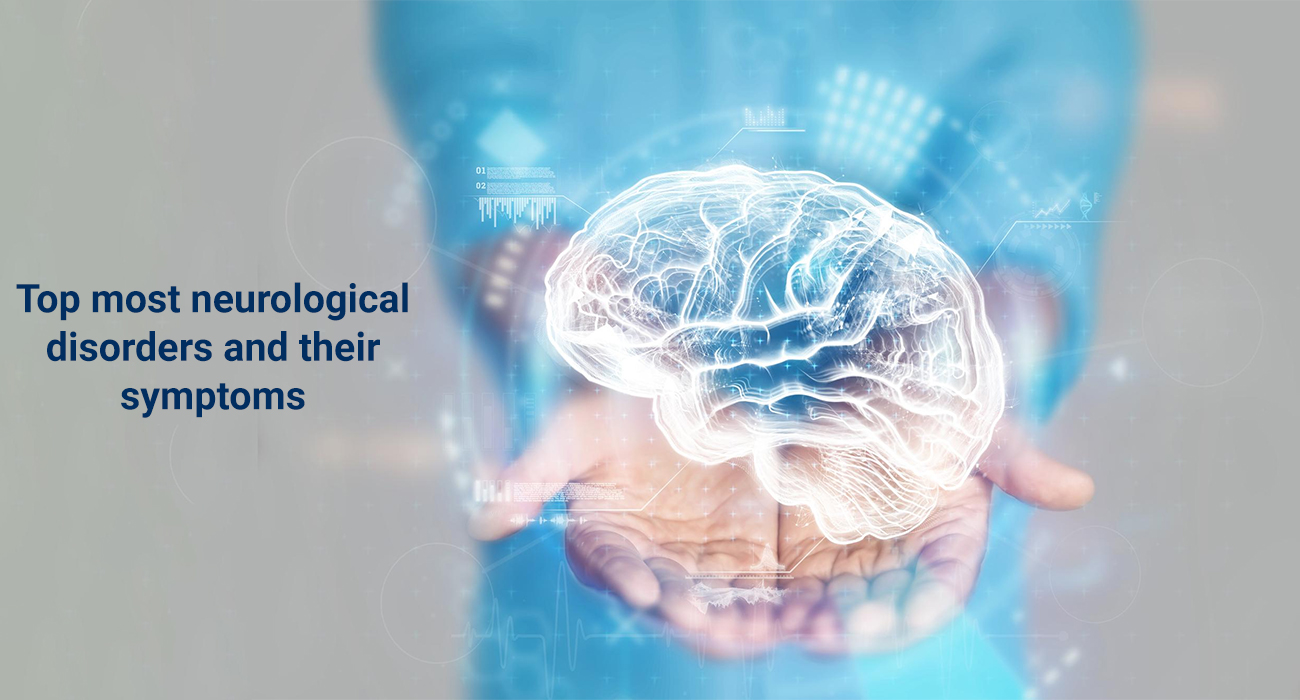Top most Neurological Disorders and their symptoms
01/04/2023
Neurological Disorders usually affect one or more parts of the nervous system. Nervous system consists of nerves, brain, spinal cord and neurons; any issue in part may cause severe neurological disorder. Biochemical structure and electrical abnormalities are some of the causes of neurological disorders. A person who suffers from neurological disorders may experience a variety of symptoms based upon their condition. Some of the most commonly caused neurological disorders may include
Parkinson’s Disease
Parkinson's Disease is a neurological disorder that is progressive in nature which means it affects the nervous system and the parts of the body that are controlled by nerves. A person suffering from Parkinson's disease usually does not experience any major symptoms in the beginning. But as the disease gets advanced, the condition of the patient becomes worse, the symptoms become more noticeable. Tremors are most commonly found symptoms that are followed by stiffness and slow movement, difficulty in speech etc. There is no cure for Parkinson's disease but with treatment from the Neurology hospital in Jaipur, medications, rehabilitation and proper care one can bring significant changes that improves symptoms and quality of life. Some of the common symptoms of Parkinson's disease may be included as
- Tremors
- Rigidity in muscles
- Pain and stiffness in motion
- Slurred speech
- Slow movement (bradykinesia)
- Difficulty in writing
- Problems in involuntary movements such as blinking
- Impaired posture
- Body balance issues
Epilepsy
Epilepsy is a neurological disorder in which usually the brain activity becomes abnormal that further causes seizures, unusual behavior, loss of sensation, loss of consciousness, loss of awareness etc Epilepsy is more common than you might think and it affects both males and females irrespective of the age and ethnic backgrounds. There are various treatments and medications that help in controlling the seizures which is one of the major symptoms of epilepsy. Further, people suffering from epilepsy may require lifelong treatment and in order to control seizures and other symptoms. According to the best Neurosurgery doctor in Jaipur some of common symptoms for epilepsy may include:
- Seizures
- Stiffness in muscles
- Continuous staring
- Uncontrollable movement such as joking of arms and legs
- Loss of awareness
- Loss of consciousness
- Hallucinations
- Fear
- Anxiety
Alzheimer’s
Alzheimer's is one of the most common neurological disorders which is progressive in nature and causes shrinking of brain cells that ultimately cause brain cells to die. There are millions of people who suffer from Alzheimer's and most of them are of age 65 and above. People suffering from Alzheimer's usually have dementia that causes decline in thinking and affects the ability of a person to function independently as it affects behavioral and social skills. The best Neurologist in Jaipur suggests that forgetting recent events and conversations are one of the early signs of the disease and as the disease progresses the person suffering from Alzheimer's develops severe memory impairment and other symptoms that makes everyday tasks difficult to perform. Though there is no treatment or cure for Alzheimer's but with the help of medications, Rehabilitation programs and support from the caregivers the complications and symptoms of the disease can be managed. Some of the common symptoms of Alzehimer's may include:
- Forgetting events and conversations
- Inability to organize
- Decline in memory
- Decline in thinking and reasoning ability
- Inability to make decisions
- Mood swings
- Delusions
- Aggressive behavior
- Irritability and rage issues
- Apathy
- Social withdrawal
- Depression
- Anxiety
Multiple Sclerosis
Multiple Sclerosis is a neurological disease that affects the brain and the spinal cord which is a part of the central nervous system. Usually, in case of multiple sclerosis, the immune system attacks the protective sheet called myelin that covers the nerve fibers which is responsible for communication between the brain and the body. As the disease gets worse it causes permanent damage and deterioration of the nerve fibers that could be fatal. Though there is no cure for multiple sclerosis, there are several treatment methods that help in speedy recovery and also help in managing the symptoms of the disease. Usually, the warning signs and symptoms may vary from person to person and their condition which also depends on the location of the damaged area. Some of the common symptoms of multiple sclerosis may include as
- Numbness
- Weakness in arms and legs
- Tingling
- Lack of coordination
- Blurry or double vision
- Vertigo
- Body balance issue
- Inability to walk properly
- Fatigue
- Mood swings
- Cognitive problems
- Slurred speech
Stroke
Brain Stroke occurs when the supply of the blood that reaches the brain is interrupted or reduced, this prevents oxygen and nutrients from reaching the brain as a result it may cause brain cells to die. In case of stroke the first hour is very crucial in order to save a person's life. Early action and medical help can help in preventing or reducing brain damage and other complications that could be fatal to life. It is necessary that one should be aware of the warning signs and symptoms of brain stroke so that one can take appropriate preventive measures in order to help the person. Warning signs and some of the common symptoms of stroke may include
- Severe headache
- Vomiting
- Dizziness
- Altered consciousness
- Blurred or double vision
- Paralysis
- Numbness of face, legs and arms
- Trouble in speaking

